Posts Tagged ‘science’
PERELANDRA, A Review
PERELANDRA is the second installment in CS Lewis’ space trilogy. Below is my no-spoiler short review, but the longer review that follows the image of PERELANDRA’s cover, will contain spoilers…beware. This is not a children’s book, but I recommend this novel to all ages who like the story. For all readers, taking the time to discuss after or along the way will deepen philosophical and theological understanding.
Link to OUT OF THE SILENT PLANET for a review of the first book in the trilogy.
5 Reasons to Read PERELANDRA, A Classic Science Fiction Story
- One of the more unique portrayals in literature of paradise and/or a pre-fallen world
- Beautiful CS Lewis prose
- The ideas are put forward clearly and by someone well acquainted with 20th century ideas
- Finally…a strong female character (there were none in the first novel)
- Read all three to make sense of what Lewis was trying to accomplish in the longer narrative arc
3 Reasons PERELANDRA is My Least Favorite of the Trilogy
- There are so few characters and the villain does not arrive until about 1/3 of the way into the book
- Not a lot of drama…there is a slow build and eventually, high drama, but it takes the novel a while to arrive (see #1)
- A lot of speech-making in the final pages. Interesting ideas, but coming at me in my least favorite non-dramatic package
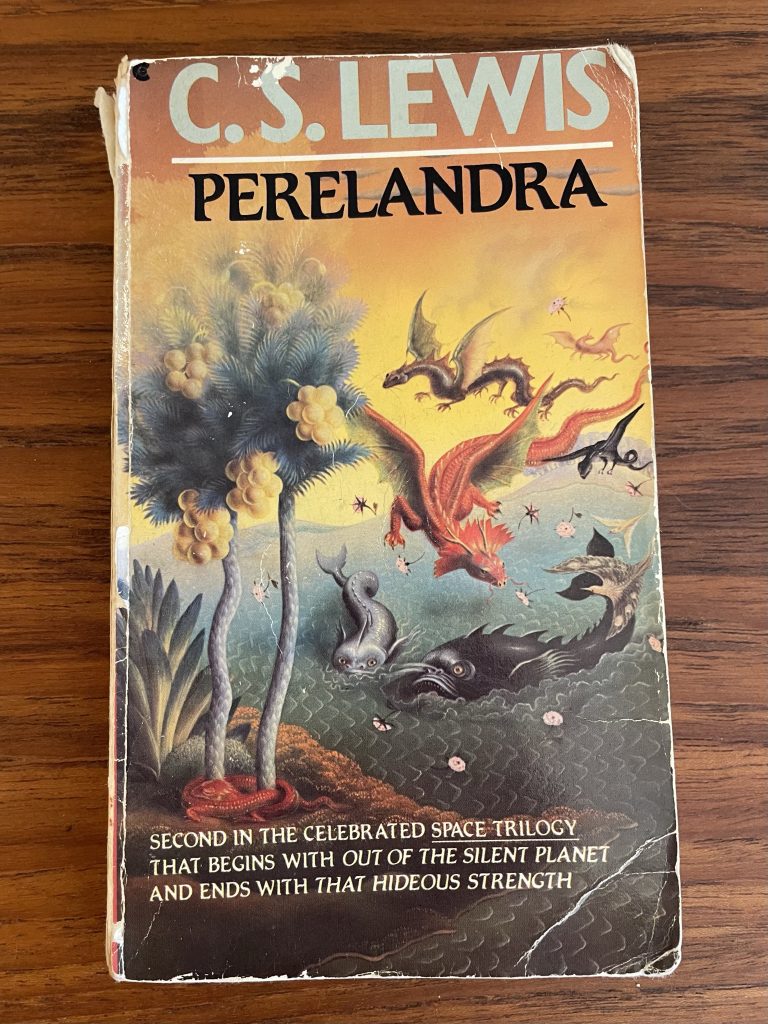
The Longer Review (With Spoilers)
While PERELANDRA is my least favorite of the three books Lewis wrote in the scifi genre, it does have its merits.
For one, anyone who has read his Narnia books, knows how well CS Lewis puts his imagination on the page. He has the ability to create a world both strange and fabulous and took on a bold task to put before the reader a paradise, a pre-civilization and pre-fallen planet with only two human-like people. Basically, he created an Eden. And how would one write this in a convincing way?
This excerpt, one of many examples…just gorgeous.
Now he had come to a part of the wood where great globes of yellow fruit hung from the trees–clustered as toy-balloons are clustered on the back of a balloon-man and about the same size. He picked one of them and turned it over and over. The rind was smooth and firm and seemed impossible to tear open. Then by accident, one of his fingers punctured it and went through into coldness. After a moment’s hesitation, he put the little aperture to his lips. He had meant to extract the smallest experimental sip, but the first taste put his caution all to flight. It was, of course, a taste, just as his thirst and hunger had been thirst and hunger. But then it was so different than any other taste that it seemed a mere pedantry to call it taste at all. It was like the discovery of a totally new genus of pleasure, something unheard of among men, out of all reckoning, beyond all covenant. For one draught of this on earth wars would be fought and nations betrayed.
Elwin Ransom, a professor of philology, is the narrator here. He was also the protagonist in Out of the Silent Planet. In this excerpt, he is telling his tale to a fictionalized version of CS Lewis after returning from his mission to the planet Perelandra. Ransom was sent to Perelandra by the angelic ruler of Mars (Malacandra). The reader is acquainted with this ruler from the previous book. In Out of the Silent Planet, Ransom is kidnapped and brought to Malacandra. That is where he meets Oyarsa, the ruler of Mars. Oyarsa does make an appearance in this novel, as does Weston, one of the academics who kidnapped Ransom in the first story. Weston, the primary rival to Ransom, acts as the tempter in this narrative. He does this not by his own cleverness and strength, but by something more frightening. Weston has given himself over to the bent angelic ruler of Earth, Satan. After Weston arrives on Perelandra in his space vessel, Ransom comes to understand his mission, that he has been sent to thwart the bent Oyarsa by thwarting Weston.
In the story, Weston is an academic with the worst intellectual vices; hubris combined with a flamboyant humanism that borders on narcissism. Tragically, he falls under a true evil in his search of spiritual answers to the mysteries he experienced on Malacandra. Weston’s journey into evil reads like something out of a horror novel (or the Bible).
“Idiot,” said Weston. His voice was almost a howl and he had risen to his feet. “Idiot,” he repeated. “Can you understand nothing?…This is the old accursed dualism in another form. There is no possible distinction in concrete thought between me and the universe. In so far as I am the conductor of the central forward pressure of the universe, I am it. Do you see, you timid, scruple-mongering fool? I am the Universe. I, Weston, am your God and your Devil. I call the Force into me completely…”
Then horrible things began happening. A spasm like that preceding a deadly vomit twisted Weston’s face out of recognition. As it passed, for one second something like the old Weston reappeared–the Old Weston, staring with eyes of horror and howling, “Ransom, Ransom! For Christ’s sake don’t let them—” and instantly his whole body spun round as if he had been hit by a revolver-bullet and he fell to the earth, and was there rolling at Ransom’s feet, slavering and chattering and tearing up the moss by the handfuls…
I was in my thirties the last time I read PERELANDRA and I did not remember how clearly this Weston character gives himself over to evil. Nor did I remember that Ransom comes to the realization that he will have to destroy Weston in hand to hand combat if he is to defeat him.
That Ransom believes he must assassinate his rival provoked my horror. Moreover, the scenes of his battle with Weston are brutal. Lewis does not hold back on that reality, but the idea of this existential battle brought to mind Dietrich Bonhoeffer. Lewis might never have known Bonhoeffer personally, but the ideas Bonhoeffer was writing about and preaching about (in Hitler’s Germany) were likely familiar to him…as they were to every thinking Christian of the time.
Bonhoeffer, while struggling to be a faithful clergy member under Nazi rule in Germany, came to terms with the idea that it was in fact a righteous or just act to kill a man who had fully given himself over to evil. That is why Bonhoeffer was executed in the end, as he played a role in an assassination attempt against Hitler. Below is an excerpt of a sermon on Colossians 3:1-4, a sermon he gave most likely after he had made the decision to collaborate with a part of the resistance determined to assassinate the Fürher.
“Instead, and precisely because our minds are set on things above, we are that much more stubborn and purposeful in protesting here on earth… Does it have to be so that Christianity, which began as immensely revolutionary, now has to remain conservative for all time? That every new movement has to blaze its path without the church, and that the church always takes twenty years to see what has actually happened? If it really must be so, then we must not be surprised when, for our church as well, times come when the blood of martyrs will be demanded. But this blood, if we truly have the courage and honour and loyalty to shed it, will not be so innocent and shining as that of the first witnesses. Our blood will be overlaid with our own great guilt.” (DBW 11, 446) (Schlingensiepen, Kindle Location 2427)
Bonhoeffer’s words evoke the idea that a conservative church is potentially an anemic one. His mention of our great guilt in the sermon I took two ways. One, the church is guilty when it does not act (or waits too long) to stand up to evil. Two, if it does join the revolutionaries, it potentially falls under the guilt of questionable acts. When evil can only be defeated by an act that lays outside of the norm of Christian ethics, there is plenty of guilt to go around. However, Bonhoeffer did not shrink back from taking on that guilt for what he (and history) thought to be the greater good. Moreover, his writings on this remain strong pillars in just-war theory and the Christian struggle with realism versus pacifism.
Lewis travels a similar line of reasoning in this novel and it should not surprise the reader that when the character Ransom leaves the planet Perelandra, he leaves having accomplished his task, but with a wound on his foot that refuses to heal this side of heaven.
OUT OF THE SILENT PLANET, A No Spoiler Review
OUT OF THE SILENT PLANET, by CS Lewis came about as a result of a coin toss between JRR Tolkien and CS Lewis in the 1930s. The understanding between the two men; one side of the coin would mean writing a science fiction novel, the other side would mean writing a time travel novel. The coin was tossed, Lewis was assigned the scifi novel. Tolkien was assigned the time travel novel. Tolkien never wrote his. Lewis did, published in 1938, twelve years before Narnia. In fact, he wound up writing three books of science fiction. OUT OF THE SILENT PLANET, which I will review here, was the first. This story is sophisticated, but there is no reason a YA reader or a very learned middle grade reader cannot take on this story. For educators thinking about assigning this book to a young person, a solid discussion on the story would make the experience a profound one.
The Short Review: 4 Reasons to Read OUT OF THE SILENT PLANET
- Superb writing and because this is CS Lewis, when you’re finished reading, your brain will have expanded
- Scintillating ideas that awaken the conscience…Plunge yourself into the mindset of a WWI veteran and a brilliant observer of history and soak in Lewis’ crucial critique of pre-WWII Europe
- Absorb Lewis’ Christian concept of God/Creator…the beauty and the moral implications
- Gain a vision for the power of fiction (imaginative science fiction in particular) as a way to change hearts and minds.
A Few More Details:
When Lewis and his friend and colleague, JRR Tolkien, both veterans of WWI, decided to toss that coin, they had been musing together about the sad state of fiction. They believed that the godless universe theory unleashed to some degree by Darwinists and proponents of the Hegelian superstate/superman, was giving rise to real beliefs (like eugenics which both understood as dangerous and evil) inside academia and government. More troublesome, these theories were making their way into fiction and infecting the broader population through story.
Americans fought in WWII and helped to defeat Hitler, so my nation (I am a US citizen) often forgets how the eugenics movement in the US was accepted and backed by some of our highest state actors, like President Woodrow Wilson. We in the US forget, maybe conveniently so, that we too were traveling on a similar road as the Nazis. This is how pervasive these ideas were and back in that day, they were considered progressive. It turns out, anything can be labeled progressive. A cautionary and hopefully humbling reminder to us in the 21st century.
Marxist ideology was also suspect in Lewis’ eyes. Both Marxism and Fascism preached an exercising of power where the end justifies the means. That idea was an abomination to Lewis and Tolkien, the rejection of which made its ways into the Lord of Rings trilogy, as it did into all of Lewis’ writings. As Christians (Lewis, an Anglican, Tolkien, a Catholic), they challenged the idea that the state has permission to sacrifice an individual for some greater good, not without that individual willingly giving up her/his life, soldiers willing to fight to defeat the existential enemy of a free state being one example of this proper sacrifice, something both of these men witnessed first hand.
In regard to reading OUT OF THE SILENT PLANET, knowing a little 20th century history and philosophy definitely helps the reader enter into the world of Elwin Ransom, the hero of the story, but even without that knowledge, this is a fascinating and well written tale. Ransom, a philologist, is on a walking tour of rural England. He is kidnapped and taken to Malacandra (the planet Mars). What unfolds is a story about relationship and curiosity (Ransom’s journey) versus dominance exercised by violence (the journey of his kidnappers). The narrative provides a resolution that exemplifies the idea that there is a standard of justice that is literally universal.
This is my third time reading OUT OF THE SILENT PLANET (notice my beat-up copy in the image above…not sure it will survive another read-through) and after finishing the book this round, I found myself dreaming about grace and kindness and goodness while I slept…something that doesn’t often happen for me after reading science fiction before bed.
12 MONKEYS A No-Spoiler Review
My son is visiting Wisconsin and after work, we are alternatingly choosing films to watch together. Two nights ago, we watched a horror flick he chose called Hereditary, which was decent, not awesome, but was made by the same film company that produced Ex Machina(which I loved and realizing now, I have never reviewed this flick on my site…must amend).
Last night, we watched 12 MONKEYS on Amazon Prime for $3.99. This film would probably be rated PG-13 today. No sexual content really, just creepy apocalyptic tension. And wow! This is still an awesome film and has aged well. Today, I asked my GenZ kid…What do you think? Would most GenZers like this film?
He said.
Absolutely. Yes.
It’s been a while since I’ve watched 12 MONKEYS, but given my vague memory of it, I thought…might be worth the time.
One pleasure, as an older film fan, was to remember Bruce Willis and Brad Pitt remarkably in the same film. Not sure it happened in any other, but what Terry Gilliam delivered on the screen between these two, was close to perfection. This is possibly Brad Pitt’s finest acting and if you’re a fan, you’re gonna have to watch. A few images below underlie my point.
First, my Short Review: 4 Reasons You Want to Watch 12 MONKEYS
- Weird and dystopian tale, echoing Blade Runner in tone and style.
- One of Terry Gilliam’s masterpieces
- Possibly Brad Pitt’s finest acting
- Bruce Willis playing his iconic gritty and misunderstood character
- Great storytelling
Just cannot get enough of these scenes, shots of these two iconic men, culture-impacting actors for the last 30 years.
And
The Longer Review
Sometimes when you re-watch a film like 12 MONKEYS, you wonder how it’s gonna age. As an older person, you think (because you have experienced this before), was I impressed because of something slightly superficial and trite, or was this film truly great? With this flick, you need not worry. 12 MONKEYS delivers on so many levels. First, it delivers on weirdness of setting, including its gritty urban reality. My son (25yo), who has watched Blade Runner understood the dystopian aesthetic of this world. He even commented on the similarity. That, in and of itself, makes me feel I am doing my job training up my children. Second, 12 MONKEYS delivers on story. There is a clear protagonist, a vaguely enormous villain (that proves to be more personal in the final scenes) and enough mystery to keep the audience in tension. Finally, there is weirdness and surprise and the best aspects of science fiction where the perspective being put forward from one or two of the characters absolutely blows up the assumptions and values of the audience. And, if nothing else, respect these images…bizarre and gorgeous. Terry Gilliam is a genius.
FOR ALL MANKIND, A No Spoiler Review
Apple Plus released its third season of FOR ALL MANKIND this month. I have not viewed any of the 3rd season but I did watch all of 1 and 2 and loved them. What follows will be the short review and a longer review of season 1 and 2. If you’re convinced by the short review…start watching now. If you need a little more data, the longer review will give you a better idea of why this many hours of consumption might be worth your time. The show is rated R for a few racy sex scenes, but if your young person can handle that, the education piece is interesting. A bit of history can be etched out or explained as some of the “alternative” version comes across the screen. It’s portrayal of communist USSR rings true. It also captures something of the spirit of the age for each decade, especially the urgency around the space race of the 1960s.
The Short Review: 6 Reasons I Recommend FOR ALL MANKIND
- If you love alternative history narratives like The Man in the High Castle, you will appreciate this story
- If you love nostalgia settings and music, think Stranger Things, you will love being immersed in this story-world, which starts in the 1960s, but spans decades.
- Most of us appreciate great casting. FOR ALL MANKIND will not disappoint
- Top-notch production value, this includes the writing, the special effects and the acting
- Good pacing. A lot of action, drama and tension throughout
- A thoughtful story. A sprinkling of social commentary for our current time…some of that commentary I liked, some I felt was contrived, but the ideas are worthy of our attention
The Longer Review: (this review contains a couple of small spoilers)
The USSR and the US are in a space race in this alternative history, set during the cold war. The USSR has landed on the moon first, claimed it as territory, and has aims to build a military compound. This traumatizes the US as a nation. The first episode captures the feeling well as it feels like a gut-punch watching the Soviet flag raised on the moon and hearing the first words of the Russian Cosmonaut as he takes the first steps…The Walter Cronkite figure on the television news reports as follows:
The first man to set foot on the moon spoke just moments ago. “I take this step for my country, for my people, and for the Marxist-Leninist way of life. Knowing that today is but one small step on a journey that someday will take us all to the stars.”
FOR ALL MANKIND was created by Ronald D. Moore (Battlestar Galactica, Star Trek and Outlander), Matt Wolpert and Ben Nedivi. They take the “what if Russia had landed on the moon before we did” scenario and create a similar history to our own, but with differences that intrigue. The writers, I surmise, are progressive in their leanings because progressive values make their way into the script and into a historically white male dominated NASA long before reality. Sometimes, it feels heavy-handed, like the writers are checking the boxes of gender and racial diversity. However, the results do make for a delightfully diverse cast.
In episode 1, the audience meets Margo Madison (pictured above, played by Wrenn Schmidt) at the beginning point of her NASA career where she is the only woman in the male dominated control center. By season 2, she emerges as NASA’s head.
By the finale of season 2, women, a couple of non-binary individuals (though they keep their gender preferences a secret), African Americans and even a Mexican female immigrant who came over the border illegally as a child, are recruited by the NASA of FOR ALL MANKIND. And who can say it might not have been this way had the US felt the pressure of its failure to land first on the moon? Also, the Soviets promote the first female astronaut, shaming the US for its lack of representation.
All the characters are well-drawn and most are courageous and longsuffering in various ways. Joel Kinnaman (The Killing, Hanna and Altered Carbon) plays Ed Baldwin, an astronaut with a big mouth who in a drunken state reveals to a reporter how NASA lost the space race because of an aversion to risk. He is punished for the reveal (taken off astronaut duty and given a desk job), but his words capture NASA’s very real dilemma. In order to stay equal to, or to get ahead of the USSR, risks will have to be taken. Many characters of significance will lose their lives to achieve the elusive prize of space dominance.
This is where the series gives commentary on current society as it poses the questions that plague our century…Who will dominate the future? US and free societies (in general) have dominated the global order since WWII, but that prize came at a great cost to many of our ancestors. We have inherited something hard fought, but that inheritance is being challenged and chipped away by those who see themselves as more deserving of dominance…and perhaps they are, but some moments in history, even national failures, have the capacity to motivate a new generation of warriors. That message shines through in FOR ALL MANKIND.
THE SILENT SEA, More Brilliance From the Korean Film Industry, A No-Spoiler Review of the Netflix Miniseries
First, the Short Review
6 Reasons I Recommend THE SILENT SEA
- Beautiful production overall, including visuals that underlie the creepy vibe
- Featured a number of my favorite Korean actors, a few you might recognize if Squid Game was on your watch list this past year
- Plenty tension and surprises/frights
- A number of science fiction and haunted house tropes embedded in the story and various characters (see more in longer review)
- The relationships and particularly, the relationship to authority feel authentically Korean. (also, see longer review)
- You know I love the miniseries genre, 1-hour installments of great storytelling that comes to a conclusion without an agonizing cliffhanger
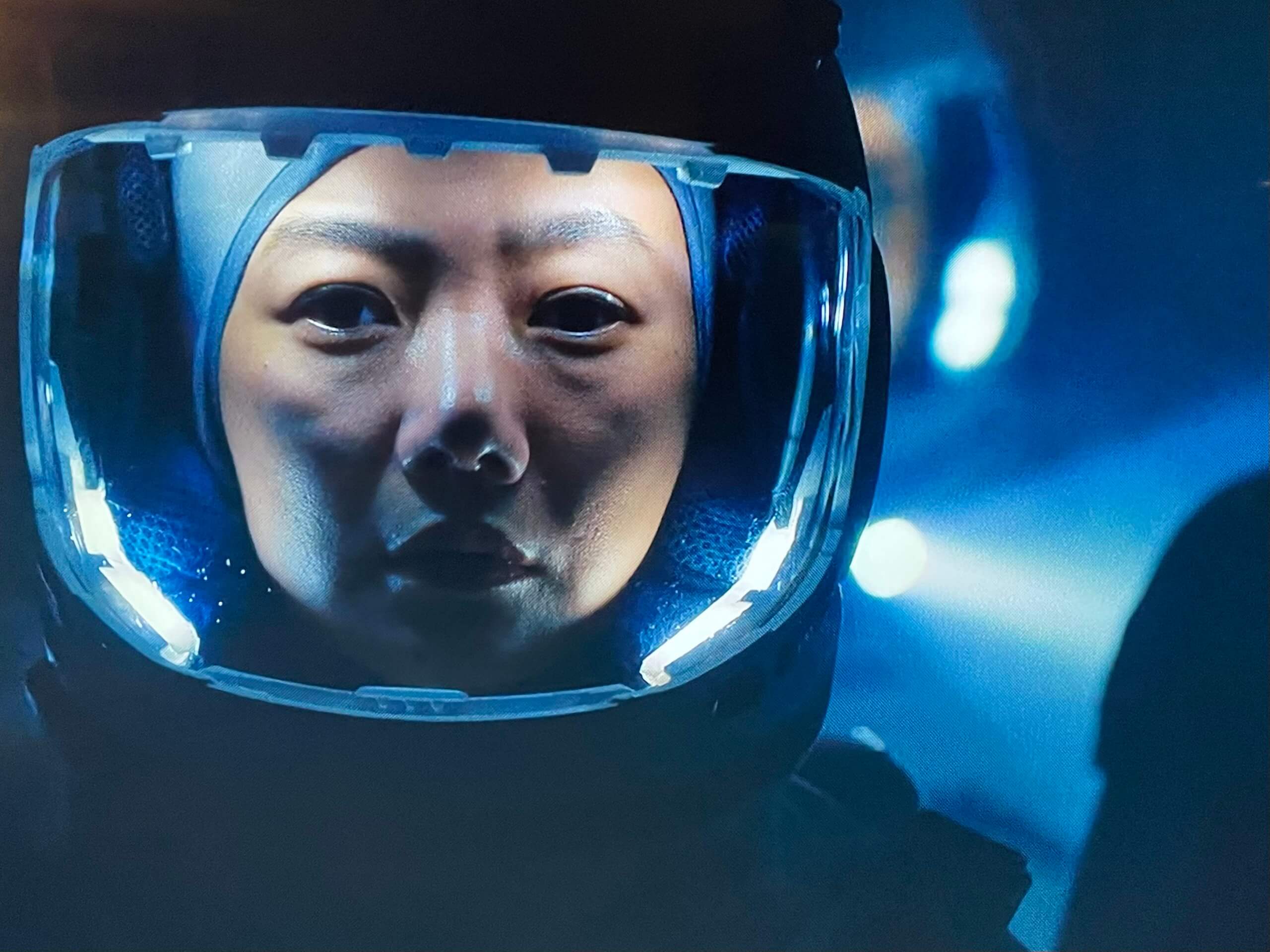
Longer Review
SILENT SEA is the story about a mission to the moon to find water. I rate this series PG-13. No sexual content in this production, but there are dead bodies, and some gore. Family-friendly if your teens are mature. It’s a fun, suspenseful ride.
The first episode quickly gives the viewer the high stakes for this mission. Drought has plagued the Earth. Water is the resource most valuable and due to its scarcity, the planet has become a wasteland. Water is rationed to such a degree, many have suffered physically, billions have died. The wealthy nations have gone into space to find a water source. Most abandoned the idea of finding water on the moon after searching, but the South Korean government kept snooping. There has been a top-secret program at a large moon station that was believed to have borne fruit, but suddenly…the experiment falters. Everyone dies all at once on the moon station. The earthbound directors, including Heo Sung-tae (pictured near end of review) initiate another mission to go to the station and investigate the truth, but secrets pulse underneath the surface of this mission and become one aspect of tension in the story. The authorities hold their cards close and the military and science leaders do not push back, though they suspect something fishy. This may or may not be an aspect of Korean-specific deference to authority, but the screenwriter exploits what I understand as deference in a way that serves the story. Also, this is where the nuanced acting plays such a powerful role in the unfolding of the narrative. The audience can see in the face of Bae Doona, the slight suggestion of twitch, a blink, a stern jaw…we see it, but barely and it helps us know that she understands that she is being deceived. Yet, in most of the outward behavior, she acts the true soldier. Doona is great at this nuanced acting, but she’s just one, among a number of these performers, who pull off such nuance. In my mind, THE SILENT SEA showcases superb writing and better acting than Squid Game. Click for a review of Squid Game

Once the mission lands on the moon, what unfolds reminded me of Ridley Scott’s Alien, in all the best ways. Yes, there will be corpses, tunnels, darkness, betrayals, a terrible and contagious sickness, but there will be one character who keeps her eyes on the prize. Dr. Song (Bae Doona) is intent on discovering the truth. In part, she seeks the truth because her sister is one of the corpses and the holder of many of the secrets. Doona as Dr. Song, pictured above, is a female lead in the Korean zombie series, Kingdom. To see my review of Kingdom, click here
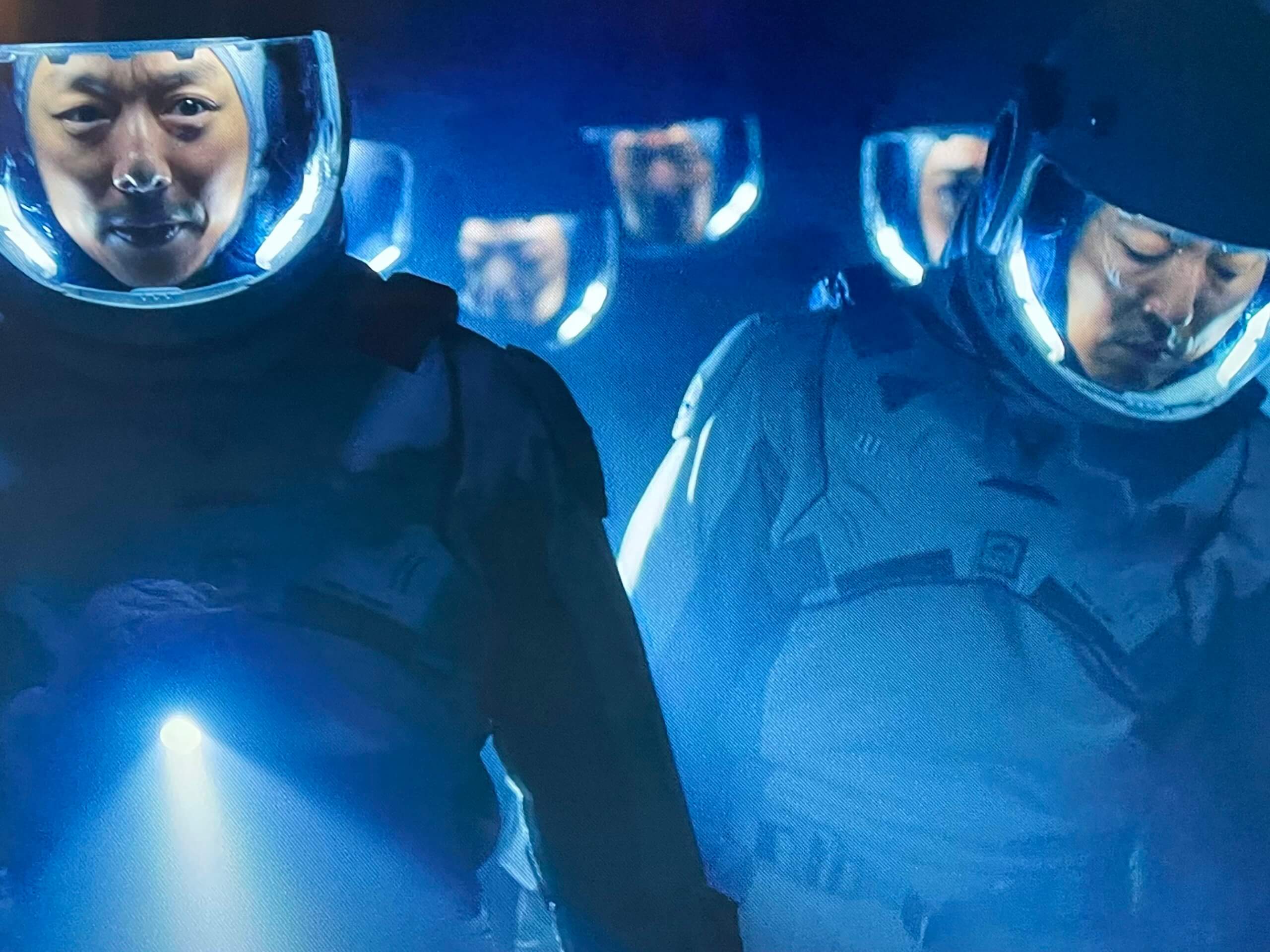
I beat this drum a lot but I do feel that Netflix streaming continues to find the best international productions and when it comes to science fiction, the Korean film/media community is putting out a lot of great product. Produced by Jung Woo-sung, directed by Choi Hang-Yong, who deftly handles the brilliant storytelling of screenwriter, Eun-Kyoi Park. Honestly, I think I could teach a five-hour course on writing with this series, moving scene by scene through the screenplay, in terms of a classic sci-fi thriller. Fun fact, this story (as did Scott’s Alien), closely follows the haunted house template. That means there are a few predictable tropes. The audience knows that the mission is doomed (at least the mission as it was originally conceived) as one by one, the team gets whittled down. Who will remain in the end…that is what the audience wonders. Regarding the various characters, the majority of them hold their own, each having his/her own arc, including the wise-cracking military scrub who just wants to go home…a longing the audience suspects will not be realized.
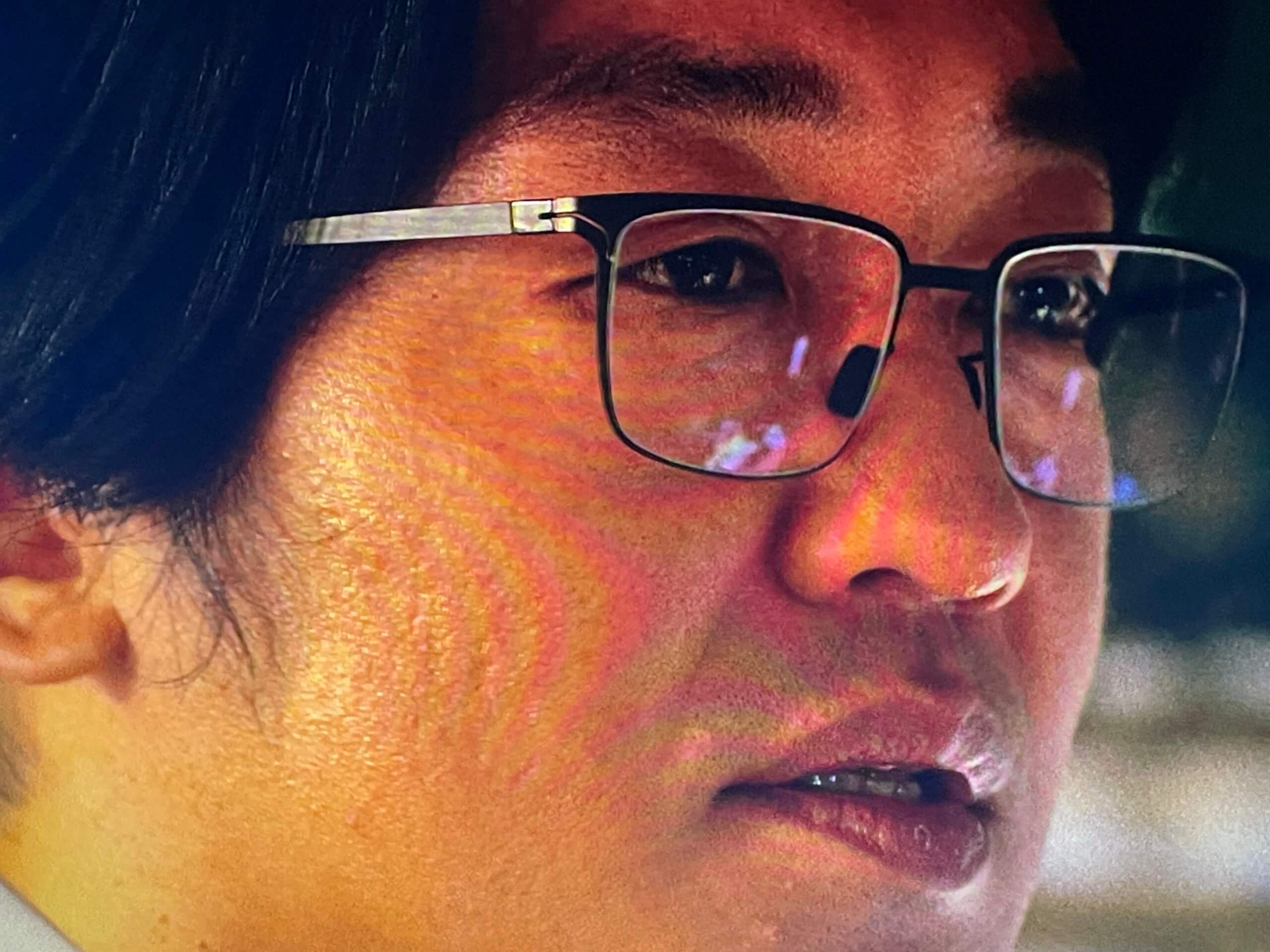
I highly recommend. THE SILENT SEA, and suspect that Netflix now has me pegged in its algorithm as a person who loves Korean-produced thrillers/sci-fi. I might need to give the Koreans their own category on my site. The product is so good, I can’t stop watching and when I watch, I always review.
ALL SYSTEMS RED, by Martha Wells, A No-Spoiler Review of the first novella in the Murderbot Diaries Series

ALL SYSTEMS RED is a story, entertaining and well-written, that one can read in about 4 hours. Rated PG-13 for adult themes. I read this novella on a flight from Minneapolis to Seattle. I flew on Delta and none of the airline’s tv/film options seemed very thrilling to me. I often try to see HBO or Showtime options when on a flight because I don’t subscribe to either of those services in real life. Thank goodness I had taken this book with me, hardback, but thin, lightweight and easy to pack because it’s only 127 pages.
And now, for my Short, No-Spoiler Review
I highly recommend ALL SYSTEMS RED for these 5 reasons.
- Original voice…the narrator has the appeal of an innocent, he/she is like a child, yet holds the capacity to narrate a futuristic society inhabited by humans and AI living and working together
- Genre bending…science fiction merged with mystery…in other words, a page-turner
- Thought-provoking ideas about AI and how future humans might understand morality/humanity in regards to AI
- Interesting world-building and a great set-up for subsequent stories
- ALL SYSTEMS RED would make a great audiobook. See the longer review for more
Longer Review:
Martha Wells has created a fascinating universe of humanity working and living off Earth, in space, in places that can only be reached via light-speed travel. She doesn’t fixate on the physics of the issue (regarding traveling across vast distances) but focuses on the gritty work life of humans and their bots. In the author’s futuristic world, full AI exist as sex workers and security units (SecUnits) and other helps in life. Also, some humans adopt robotic parts (augmented humans). So, there is a mix of how humans have integrated with tech and within the story world, there is little “judgment” about these realities.
While this is all true, the AI mind that narrates this story has a judgment about itself and humans. The view is not completely skewed toward disgust for humans, though there is some leaning in this direction. Granted, I’ve only read the first 1.5 novellas. But what works in the narrative is that Wells has put forward a more dispassionate, yet charming view of the world the way it is. I highly recommend these novellas as entertainment and am slowly discovering how they speak into deeper moral questions around humanity’s race toward the future, a future in which robots and artificial intelligence will be embedded. These books might appeal to the YA reader because the narrator is endearing and “young” feeling. The value in their education would be the discussion around tech and humanity’s future.
Regarding the narrator. The voice is absolutely charming. I did not listen to the book, but can imagine the voice. This book would be a pleasure to listen to.
To buy the first book, click on All Systems Red
Four of the series in hardback can be bought together. Click on Murderbot Diaries
For the least expensive version to try out novella #1, click on Kindle version: All Systems Red
For the audio version of novella #1, click on Audio of All Systems Red
SPACE SWEEPERS, A No Spoiler Review

5 Reason to Watch Space Sweepers, The Short Review
- characters, they’re funny, quirky and smart…They reminded me of many beloved STAR WARS characters
- Special effects, on par with cinematic space opera’s like Star Wars
- Family friendly, nothing offensive for parents trying to figure out what to show their kids
- Excellent space battles
- An ultimate choice for the main character(s) that packs an emotional punch
 The Longer Review
The Longer Review
This film assumes a space opera vibe and so reminded me of Star Wars, yet felt original. The pacing of this screenplay gave exactly the right amount of info while embedding a few nuggets that made me go back a rewatch portions. That was rewarding and I loved the heartbeat of the story’s core…the transformation of a rogue…think of Han Solo and his journey.
Not that this story only bleeds a happy ending. There is a tragic trade that takes place, a brutal choice for the main character. However, the overall adventure ranked above my expectations. When I’m streaming something online like this, I’m not expecting brilliance, but when it’s Korean made, I am coming to expect top-notch production. The Korean film industry is doing something right by focusing on great storytelling and upping the game at every turn when it comes to investing in the visual feast. SPACE SWEEPERS is no exception.

I will continue to seek out, watch and review Korean-produced scifi/horror/speculative fiction because in the last 2 years or more, the flow of great content is undeniable. For more Korean-productions that I’ve reviewed, see:
KINGDOM, A Review of a Korean-Made Masterpiece
SQUID GAME, A Review without Spoilers
TRAIN TO BUSAN, A No Spoiler Review
DUNE Part 1, The film. A No-Spoiler Review

In a similar way that Peter Jackson pleased both the non-reading audience and the hyper fan of the LOTR books, it looks like Villeneuve will do the same for the his audience and fans of the novel, DUNE.
DUNE, the film, is the first of two. It’s only about half of the novel (yet another reason to entice your teen to read the novel), and there could be more films if Villeneuve decides to continue with the novel’s sequels. We’ll see how that goes. The later books are brilliant but probably more challenging for the average audience member to consume. Herbert’s world is a complex and mostly unhappy place on almost all counts.
First, The Short Review of DUNE
5 Reasons to See this Film, Especially if you are a Scifi Fan…
- Mostly pitch perfect and accurate (close to the novel) storytelling
- Herbert’s DUNE is a foundational work in the scifi genre and has a huge international following. Without DUNE, Star Wars might never have been made.
- A vision within the story that transcends culture and era
- Great casting
- An epic visual feast
Now, for the Longer Review…
If you want to go deep, super deep on DUNE, there are papers written, blog posts and articles that speak to why the story DUNE is one that has reverberated in many cultures, especially subjugated cultures, since it was released in 1965. This article is a good one, in case you want more breadth about the history. Click on the link for the Guardian’s penetrating reflection. DUNE article, Guardian.

True, the viewer is only getting a third of the character depth in the film version and for that reason, I encourage all to read (or re-read) the novel. It ages well. But, even if you don’t read the novel, Paul, Leto, Jessica, Duncan, Kynes and the Fremen come across very close to the novelist’s vision. I had two observations of change that caught my attention: Villeneuve did not portray the Atreides’ mostly male in-house staff accurately in terms of their suspicion of Jessica as the betrayer. Their suspicion of the one woman in the mix comes through in the novel, not in the film. Also, the gay Baron Harkonnen is a known child predator in the novel. I can guess there are many reasons Villeneuve decided to forgo this portrayal of the only gay character in the story world. Let him be obese and disgusting in the visuals, but diminish his child predator persona. That seems like a wise decision on many fronts.
The portrayals I loved:
Arakkis, the worms, the Fremen, the sitch, the general feeling of the Bene Gesserit, the Harkonnens, the Sardaukar, the ornithopters, Arrakeen, the costumes (including the stillsuit)…these are all perfect, as are the actors’ portrayals of their characters.
Overall, DUNE was worth the time and money. I highly recommend this film.
FOUNDATION, A No Spoiler Reveiw of the first 2 Episodes

Why unthinkable? The Foundation Series, which began as a few short stories, but over the course of Asimov’s life, evolved into something much more vast, portraying the slow downward spiral of an empire in a sprawling universe over many centuries.
Apple, having bought the rights to the Foundation Series in 2019, invested a large sum to make this happen. The story is definitely being tweaked by Goyer and Friedman, but I am appreciating the adjustments because the Foundation Series novels did not appeal to me. Too many supposedly smart dudes sitting in rooms and talking at one another. Too many ideas delivered in a way that felt preachy to me, therefore dull. Characters that felt interchangeable and almost zero females.
But how about the series? So far I am loving what is evolving on screen. If you’re a scifi fan, here’s why I think it’s worth watching.
- The core of Asimov’s ideas are all there, the story well told so far
- The production design, the sets and costumes are fabulous
- The acting has been surprisingly good
- The screenwriters have changed some of the male characters to female, including Gaal Dornick, the lead character in these first 2 episodes. Dornick, pictured below, is played by Spanish actor, Lou Llobell.

For educators, the idea of eternal rule (by cloning) raises interesting ethical questions, like: How will science and technology impact the governing of humanity?
The third episode drops this Friday, October 1st.
DUNE, Chapter 1. A Study on Craft
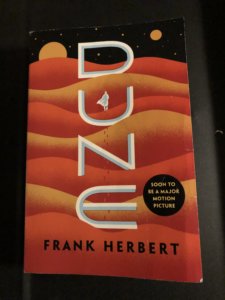
For educators: This post is appropriate for teens who have read Dune and might want to to improve their storytelling/writing skills.
I happen to be in a writing critique group that started up this past week. A couple of the folks in this group are writing novels and sent in first chapters for a swipe at getting feedback. So, I read a few first chapters yesterday and in the course of my reading, I began to wonder…Do these seem like first chapters to me? How do I feel as a reader as I am taking in the narrative for the first time? Do I begin to have a strong sense about the story, the characters and about the writing style? Absolutely. I did and do have feelings and ideas. Some of those made me want to keep reading. Others did not.
That led me to the question: How does a novelist write a brilliant chapter one that makes you want to keep reading?
I wonder about my own first chapter, the beginning of my novel that is undergoing an extensive edit. What is it accomplishing and what is it not accomplishing? Have I done the necessary work to hook my reader, keep them interested and engaged, settle them into the world I am creating?
All writers of any genre ponder this question when they sit down before the blank page because the possibilities are endless, as endless as stories themselves. However, I do think there are ways to understand first chapters, to critique and edit them for the purpose of making them better.
Therefore, I begin a series of posts devoted to the question of beginnings. My focus will be on science fiction and fantasy novels and the hope is not to be prescriptive. Telling the writer what to do or not do detracts from originality and art. However, paying attention to how great authors craft a narrative is worthwhile. We learn from the greats. Study enough greats and we begin to see common threads.
So, my goal in this series of posts is to plunder first chapters and see what I can glean about my own writing and will record my findings for the sake of other writers.
 A Look at DUNE, Chapter 1
A Look at DUNE, Chapter 1
Frank Herbert is a great writer and though the novel DUNE isn’t perfect, it’s very close to perfect. How does that first chapter set us up for a marvelous journey?
I see it accomplishing four things.
Chapter 1…
-Gives us a sense of the setting in which the story will take place
-Introduces the primary characters, even putting the main character through a first test
-Hints at the coming conflict
-Tantalizes the reader with compelling mysteries that make you want to keep reading
Chapter 1 of DUNE give us a sense of the setting.
Here is the first sentence of the novel.
In the week before the departure to Arrakis, when all the final scurrying about had reached a nearly unbearable frenzy, an old crone came to visit the mother of the boy, Paul.
Most of us have experienced moving houses, cities, states. We know what it feels like to change locations. In this first sentence of DUNE, the reader is alerted immediately to the fact that a change in location is taking place for this particular family, for this particular person, Paul. Moving is disruption. Paul’s family is about to be disrupted. He will soon be leaving Caladan for a planet called Arrakis, sometimes called Dune.
Soon after, in the early paragraphs, Herbert repeats this series of words three times as paragraphs. They jump out on the page like a refrain. They are written in italics, which in Herbert’s style, represents thought. Paul, the main character continues to mull over this reality.
Arrakis—Dune—Desert Planet
So, not only will Paul be leaving his current location, but the new location is harsh. There is a sense of foreboding about this desert planet. Paul will move from Caladan, a land where water is plentiful to Arrakis, where water is scarce. Caladan is known, comfortable, secure, a virtual paradise. Arrakis is mysterious, uncomfortable in so many ways, in part because of its climate. Climate will be a large issue in the rest of the novel. Herbert wants the reader to begin thinking about ecology and its importance to a planet and a people.
Here is the second sentence of DUNE.
It was a warm night at Castle Caladan, and the ancient pile of stone that had served the Atreides family as home for twenty-six generations bore that cooled-sweat feeling it acquired before a change in the weather.
When Paul’s family leaves Caladan, they are not only leaving their current comfortable home/castle, but they are leaving their home of twenty-six generations. This move is an epic move. The reader is left asking…why? Why leave this lovely planet and this home of so many years? We get a few clues as to why this move it taking place. Power and political maneuvering are introduced, a profound subject of the story.
Thufir Hawat, his father’s Master of Assassins, had explained it: their mortal enemies, the Harkonnens, had been on Arrakis eighty years, holding the planet in quasi-fief under a CHOAM Company contract to mine the geriatric spice, mélange. Now the Harkonnens were leaving to be replaced by the House of Atreides in fief-complete—an apparent victory for the Duke Leto. Yet, Hawat had said, their appearance contained the deadliest peril, for the Duke Leto was popular among the Great Houses of the Landsraad.
Arrakis is the place where the empire derives its most important resource: Melange, or spice, as it is sometimes called. Melange is the secret to space travel in this particular universe.
We can already see now how the chess pieces are stacking up, a sense of the conflict.
This brings us to the second accomplishment of Herbert’s chapter one, the introduction of most of the main characters.
Paul is mentioned in the first sentence. So is his mother. Paul’s mother and Paul are on the stage for the very final scene of the novel as well. In fact, his mother gives voice to the final paragraph/speech.
Not only that, but the crone mentioned in that first sentence, the one who will test Paul later in the chapter, will also be on that stage at the finale. This is great writing.
Add to the list the Bene Gesserit, the Fremen, House Harkonnen…all are mentioned, Thufir Hawat, (who will be present in the final scene) and Dr. Yueh, important as the one who betrays House Atreides…all are introduced in chapter 1.
Note this paragraph early in the chapter.
Paul awoke to feel himself in the warmth of his bed—thinking…thinking. This world of Castle Caladan, without play or companions his own age, perhaps did not deserve sadness in farewell. Dr. Yueh, his teacher, had hinted that the faufreluches class system was not rigidly guarded on Arrakis. The planet sheltered people who lived at the desert edge without caid or bashar to command them: will-o’-the-sand people called Fremen, marked down on no census of the Imperial Regate.
The Fremen will become important to the story, of primary importance, but the reader is simply introduced here. There is mystery surrounding these people. I am curious. I want to learn more and Herbert will plunge me into Fremen culture before too long.
It’s interesting to note who is left out of chapter 1.

Chapter 1 hints also at future conflict.
As Paul is undergoing the test, the gom jabbar, here is what the Reverend Mother, the crone says to him.
The old woman said: “You’ve heard of animals chewing off a leg to escape a trap? There’s an animal kind of trick. A human would remain in the trap, endure the pain, feigning death that he might kill the trapper and remove a threat to his kind.”
As I was re-reading the chapter last night, this nugget stopped me in my tracks. I had not realized, not seen how this Reverend mother quote foretells the remainder of the story.
Paul does feign death on Arrakis, so that he might kill the trapper and remove the threat to his family. That is, in essence, a summary of the novel. These two sentences are so brilliantly placed, subtle in all the best ways. We don’t understand consciously upon first reading, but Herbert has just told us what we can expect.
Lastly, chapter 1 teases the reader with mysteries.
This is an odd world, a mysterious one in which a mother of an only son, will give him up to a religious figure, knowing he might die.
Jessica stepped into the room, closed the door and stood with her back to it. My son lives, she thought. My son lives and is…human. I knew he was…but…he lives. Now, I can go on living.
This we absorb and I, at least, want to read to find out more about this bizarre world where such a thing would happen. In order to know more, I must keep reading.
Then, there is the planet Arrakis and the Fremen. In chapter one, we learn very little about them, but we wonder about them as Paul does. The planet is a desert and the Fremen seem to live off the grid. They are wild and uncounted by the empire. Who are they? We are meant to wonder, and to find out, I have to keep reading.
And lastly, in Chapter 1, Herbert introduces the reader to the idea of the Kwisatz Haderach, a messianic figure. Is Paul the Messiah? The reader suspects he is, though Paul himself struggles with this identity throughout the novel, mysterious even to him. We will have to keep reading if we want to figure out the true identity of the Kwisatz Haderach.
So…all of this in Chapter 1. I am wowed and I am hooked. I am also set up well in the world to take in more of the details as they unfold. Moreover, I have enough sense of the main characters to be able to navigate this complex world where many more characters will soon be introduced. It makes me wonder how many times Herbert went back to edit and perfect his beginning…because I don’t think he could have written a better version than the one we read today.
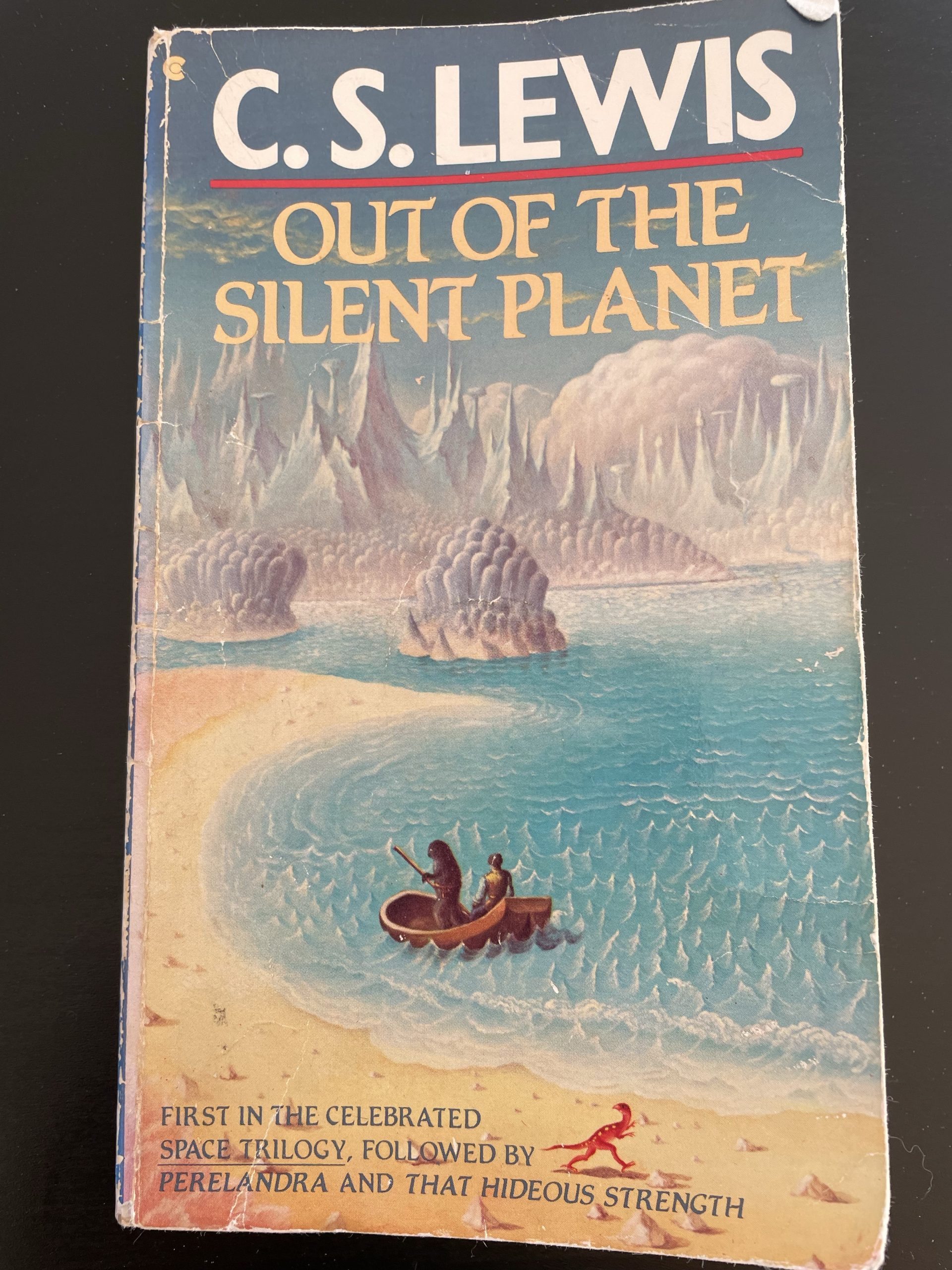

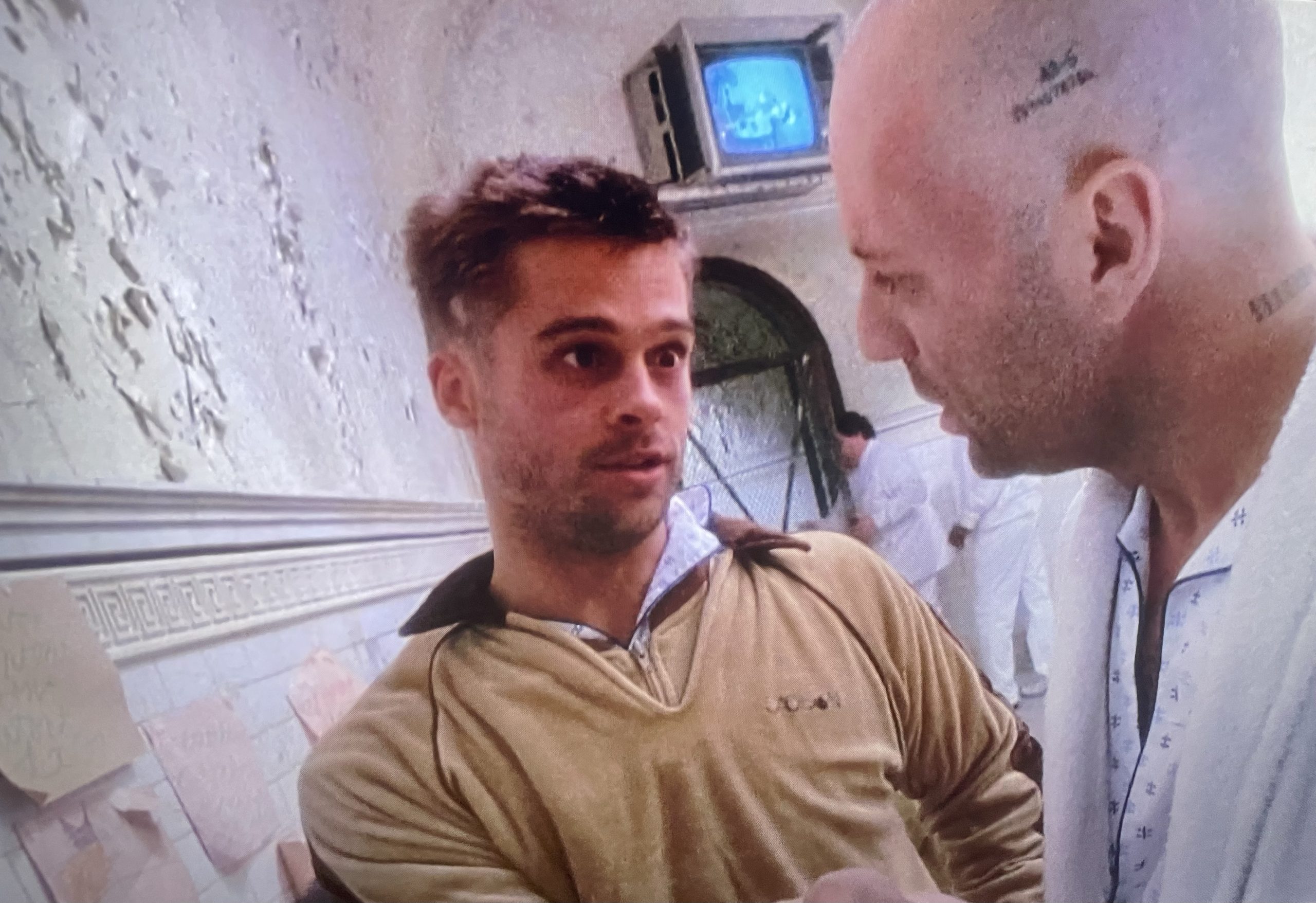





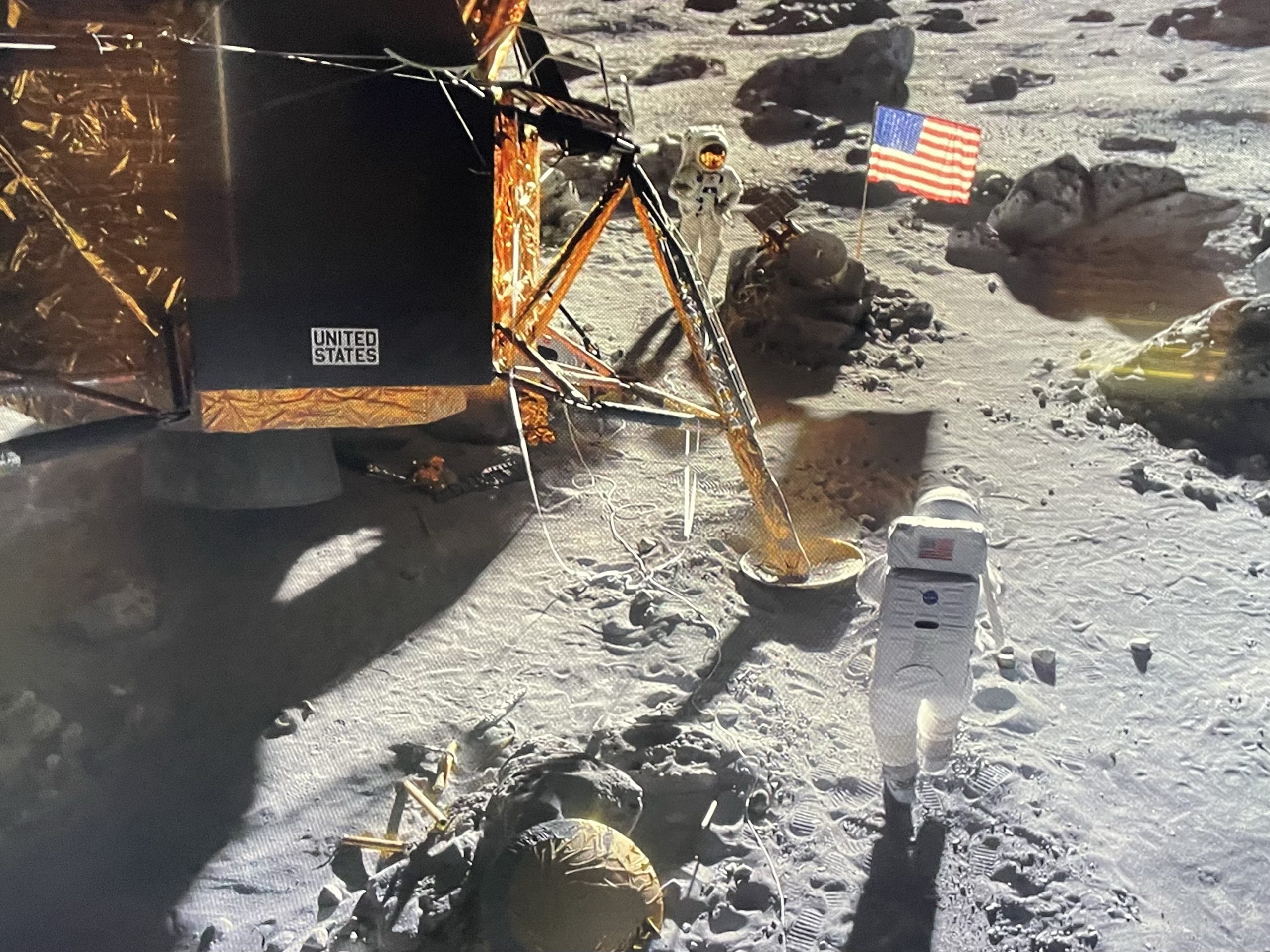

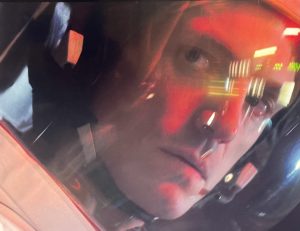
 The Longer Review
The Longer Review



